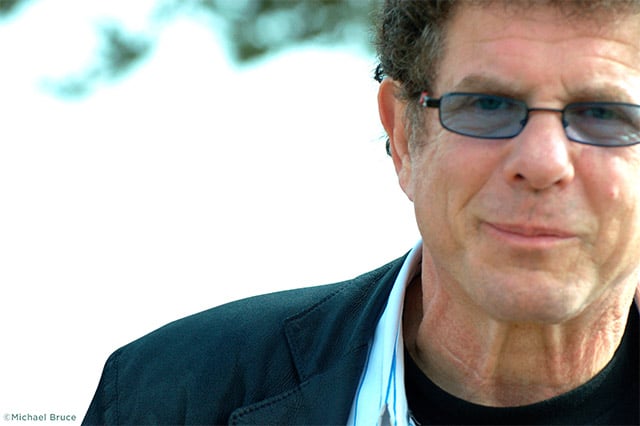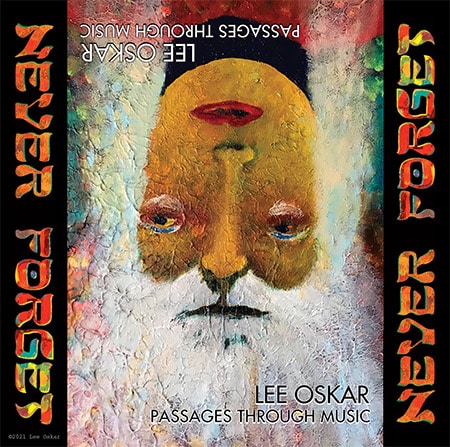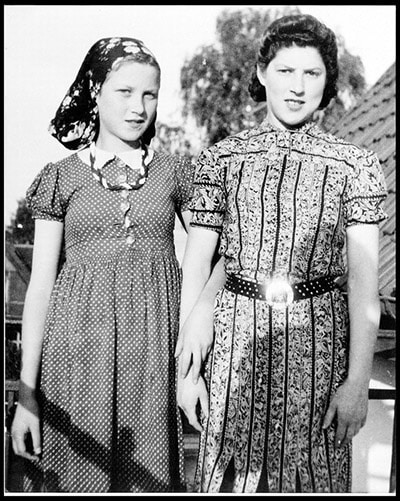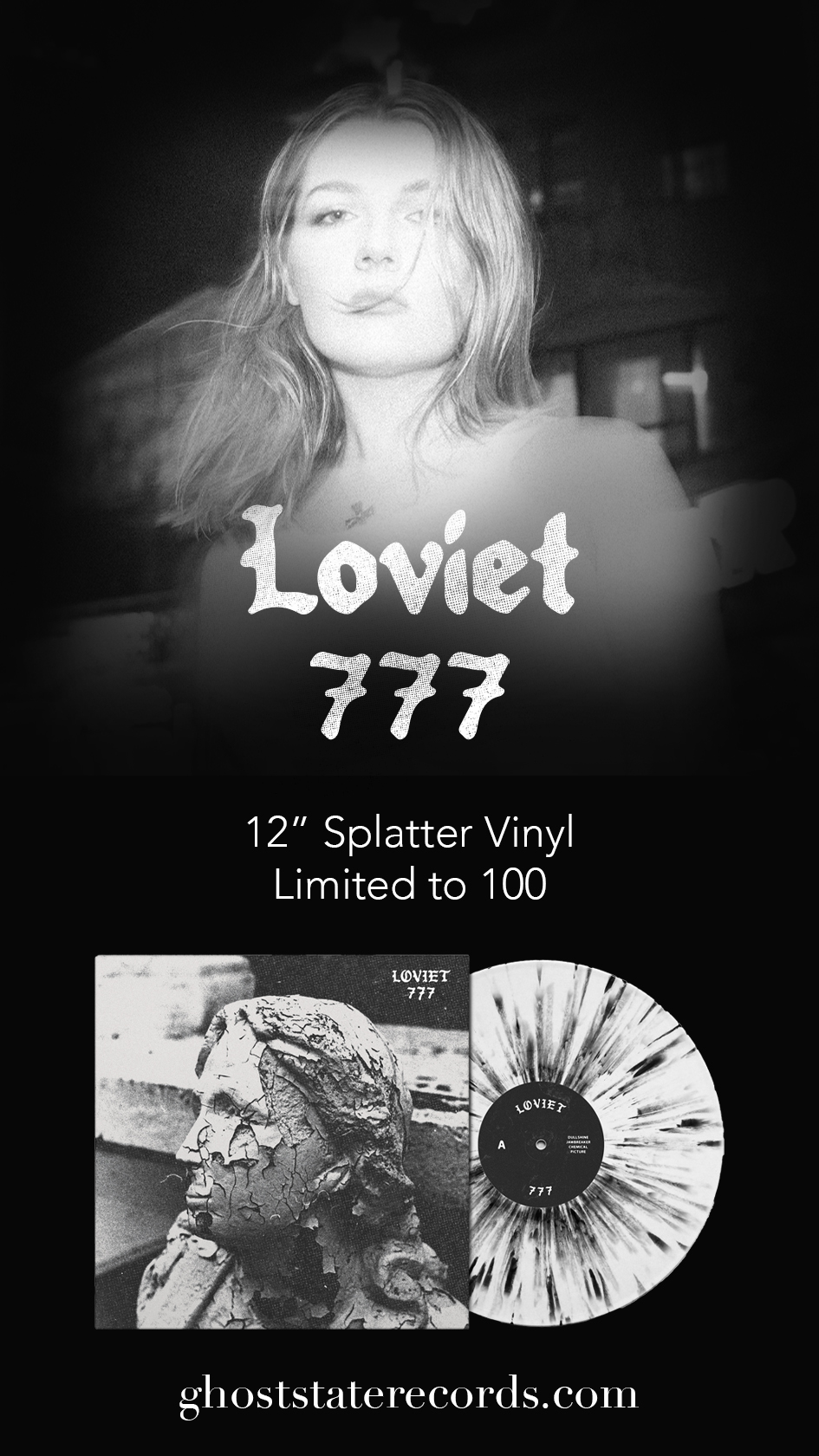
Allowing people to know you’re Jewish can get you killed. Lee Oskar has been aware of this his entire life.
A musician best known his playing and songwriting for a quarter-century with the band War, Oskar, 73, today released what he calls his “artistic memoire.” Devastating, “Never Forget” includes nine songs he wrote over his lifetime, which is most powerful when listening to while reading his liner notes and seeing the album cover painting and photographs, especially a black-and-white image of two teenaged sisters — his mother and aunt who miraculously escaped a Nazi death camp.
“I’ve created a lot of hook lines (such as) ‘Low Rider,’ and cute melodies and all that,” Oskar said. “But I had never expressed — let me put it bluntly – what’s fucked with me for a long time and still does. It’s unbearable what the Nazis did or what humanity will do. If I hadn’t expressed what I feel, I would have died really failing as an artist.”
“It was liberating. I still have fears of antisemitism. That takes guts for me to have done this. I don’t want people to come knock on my door and shoot me. That’s the fear I have of being Jewish.”
Anyone who feels Oskar’s fear of retribution for “Never Forget” is hyperbole doesn’t care to remember 6 million Jews were murdered in the Holocaust. Or worse. History repeating itself is a frightening prospect. Peruse national headlines from just the week of the album release:
- Schools in Tennessee banned Art Spiegleman acclaimed children’s book about the Holocaust, “Maus.” McMinn County Board of Education’s vote was a unanimous, 10-0.
- Screaming “Hiltler should have killed you all,” a woman in New York spit on three Jewish children. She was arrested.
- A rabbi and three others were held hostage in Texas at Congregation Beth Israel synagogue.
- A Virginia man who wore a “Camp Auschwitz” sweatshirt pleaded guilty more than a year after he and hundreds more invaded the United States Capitol.
“It’s going to take a long, long, long time before humanity comes together as a whole based on individuality rather than stereotyping,” Oskar said. “I think the stereotyping comes because they fear. I think the wrong way of communicating is when people say, ‘You’ve got to appreciate the differences in people.’ The right way in my opinion is we have so much commonality that there’s hardly any difference.”

Music can bring people together.
Most of the songs on “Never Forget” are instrumental and performed by nearly 30 artists from Oskar’s home state, Washington, and Tel Aviv. There are Hebrew-singing spiritual street artists from Israel, intricate string and brass arrangements. The standout track, “World For Peace,” includes a contribution of Oud player Waseem Odah – “He’s the Muddy Waters of the Middle East; the blues is a world music.”
Oskar plays harmonica.
In Billy Boy Arnold’s newly released autobiography, “The Blues Dream,” the author writes, “(Oskar) can play the shit out of that harp and make it sound like different instruments.”
“Never Forget” opens with a song “Far Away Dreams,” upon which Oskar’s harmonica sounds more like a soprano saxophone. The song sets a mood of an unfolding poignant story.
Oskar was named for his grandfather, Osser, who died before the 1939 Nazi Germany invasion of Poland. Grandmother Mina had three children, a son, Abe, and daughters Judy and Rachel, who became Lee Oskar’s mother. They lived in Soviet Russia occupied Lithuania. More than 140 family members were murdered by Nazis or Lithuanian collaborators. Judy’s blonde hair and blues eyes played a role in a remarkable escape.

According to The Judy Project website, “In 1944 Judy, Rachel, Abe and their mother Mina were … packed into a train destined for a German Nazi concentration camp called Stutthof. Abe was transferred to a train and sent to Dachau concentration camp. Judy was in line with Mina to enter the gas chamber when a guard ordered her to run back to the barrack and so she did. She found Rachel and told her they don’t have a mother anymore.”
In January 1945, when the Russian army closed in, about 1,000 female prisoners were sent on an 8-mile “death march” to another concentration camp. When bombing occurred, Judy and Mina escaped to a farmhouse. A Russian POW who worked on the farm helped led them to a nun cloister. Details of their harrowing escape to Denmark can be found at www.judymeisel.com
“They pretended to be Christian,” Oskar said. “They were the only ones they knew of who escaped. They thought they were the only Jews left.”
In 1954, the sisters learned that their brother Abe has escaped, too.
“My mom could never talk about it,” Oskar said. “But her younger sister Judy became an amazing activist. It’s day and night how people handle things. Everybody comes out of it differently. … The atmosphere was always this nervousness my mother would carry. You could drop a cup and she’s start crying.”
“It’s all about how to maintain a life without falling back into something that can hurt you again. That’s what compelled be to leave home at a young age. I wanted to make it in the music business, but I carried this stuff in me all the time.
“It’s always been in me but to face it and tell it out loud, ‘Never Forget!’ and tell the story with the liner notes. If I can contribute just a little bit more to humanity to try to change things for the better, that’s very important.”
Oskar will perform the songs from “Never Forget” arranged for a quartet on March 11 at the Triple Door in Seattle.
Notes: Jimi Hendrix last performance was Sept. 6, 1970, when he joined the band War for a show in London. “He was standing right next to me,” Oskar said. “He wasn’t feeling good that night. He was kind of leaning against the back wall and he even knew my name. He said, ‘Lee, am I sounding OK?’ He wasn’t in the greatest shape but he was amazing.” … War, created by Oskar and Eric Burdon, who had disbanded The Animals, was unique in its sound that included a pairing of Oskar’s harmonica and Charles Miller’s saxophone. “Today, it would be called World Music,” Oskar said. Founding members Oskar, guitarist Howard Scott and drummer Harold Brown now perform as the Lowrider Band. They lost the name War to their ex-manager in a mid-1990s federal court case. … “Maus” is the only graphic novel to win the Pulitzer Prize. … International Holocaust Remembrance Day, Jan. 27, marks the day Jews were liberated from Auschwitz in 1945. … Two-thirds of American millennials surveyed in a recent poll cannot identify what Auschwitz is, according to a study conducted by the Conference on Jewish Material Claims Against Germany. … In 1963, days after attending Martin Luther King Jr.’s “I Have A Dream” speech, Oskar’s Aunt Judy saw on the news that a black family moving into a white neighborhood in Folcroft, Pennsylvania, was facing violent riots with more than 1,500 people throwing rocks and molotov cocktails at the family. Judy baked her favorite merengue cookies and drove to the Baker house to deliver a care package and show them her support.
-Tim Parsons


